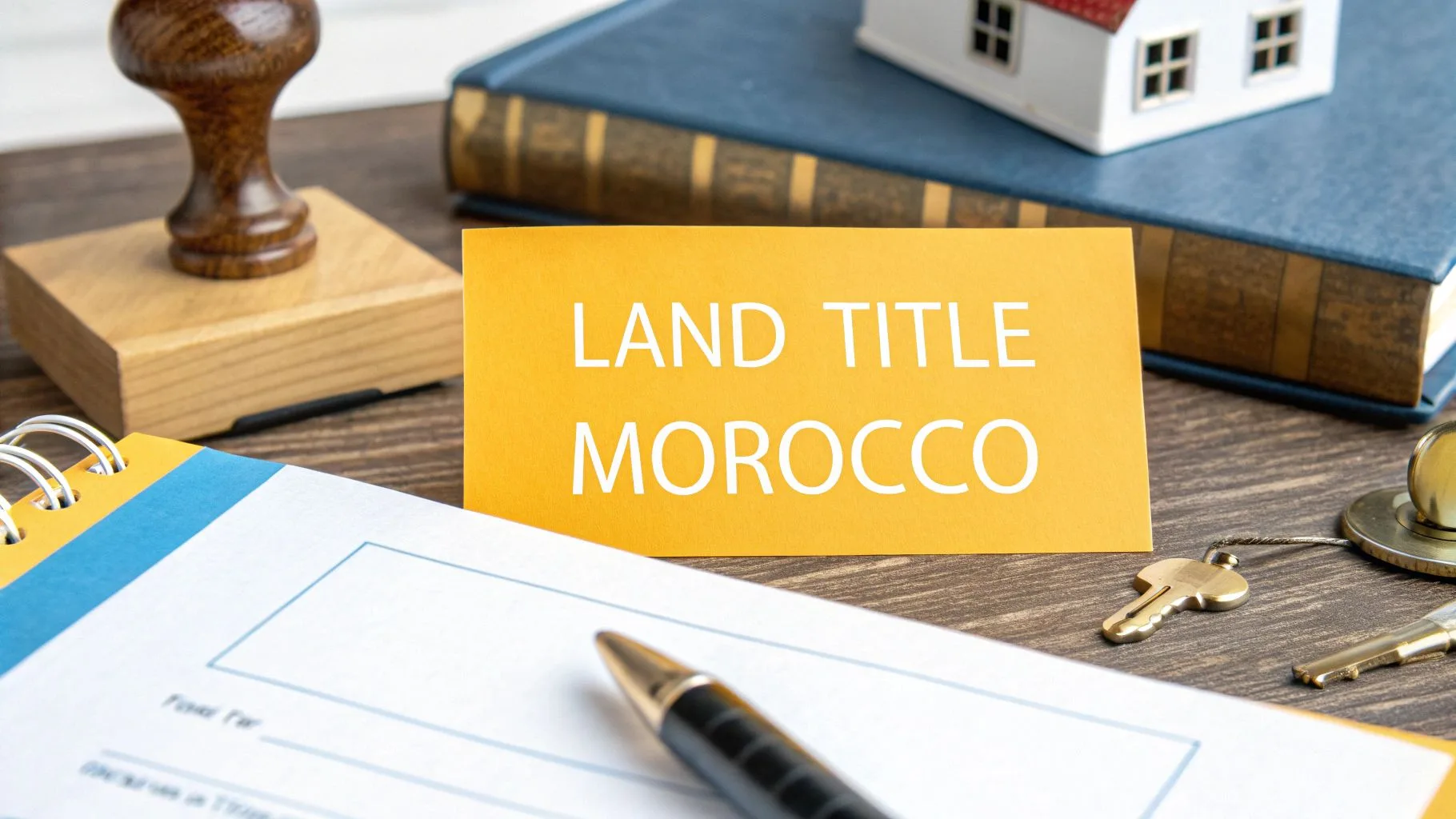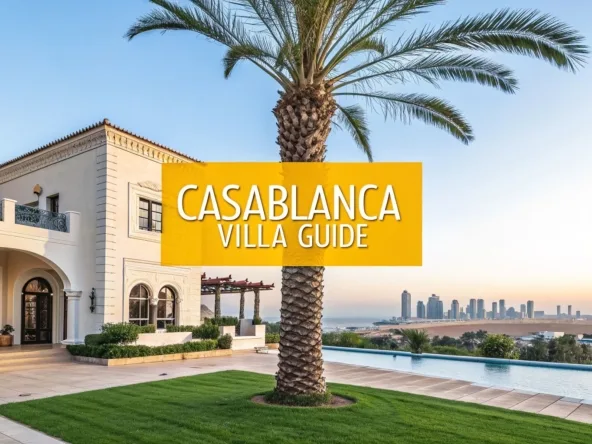When you're navigating the Moroccan real estate market, one term stands above all others in importance: the titre foncier. In Arabic, this document is known as الرسم العقاري (Al-Rasm Al-Aqari), and holding it is the ultimate proof that you own a property. It’s the gold standard, a government-guaranteed testament to your rights.
What Is a Titre Foncier and Why Is It So Important?
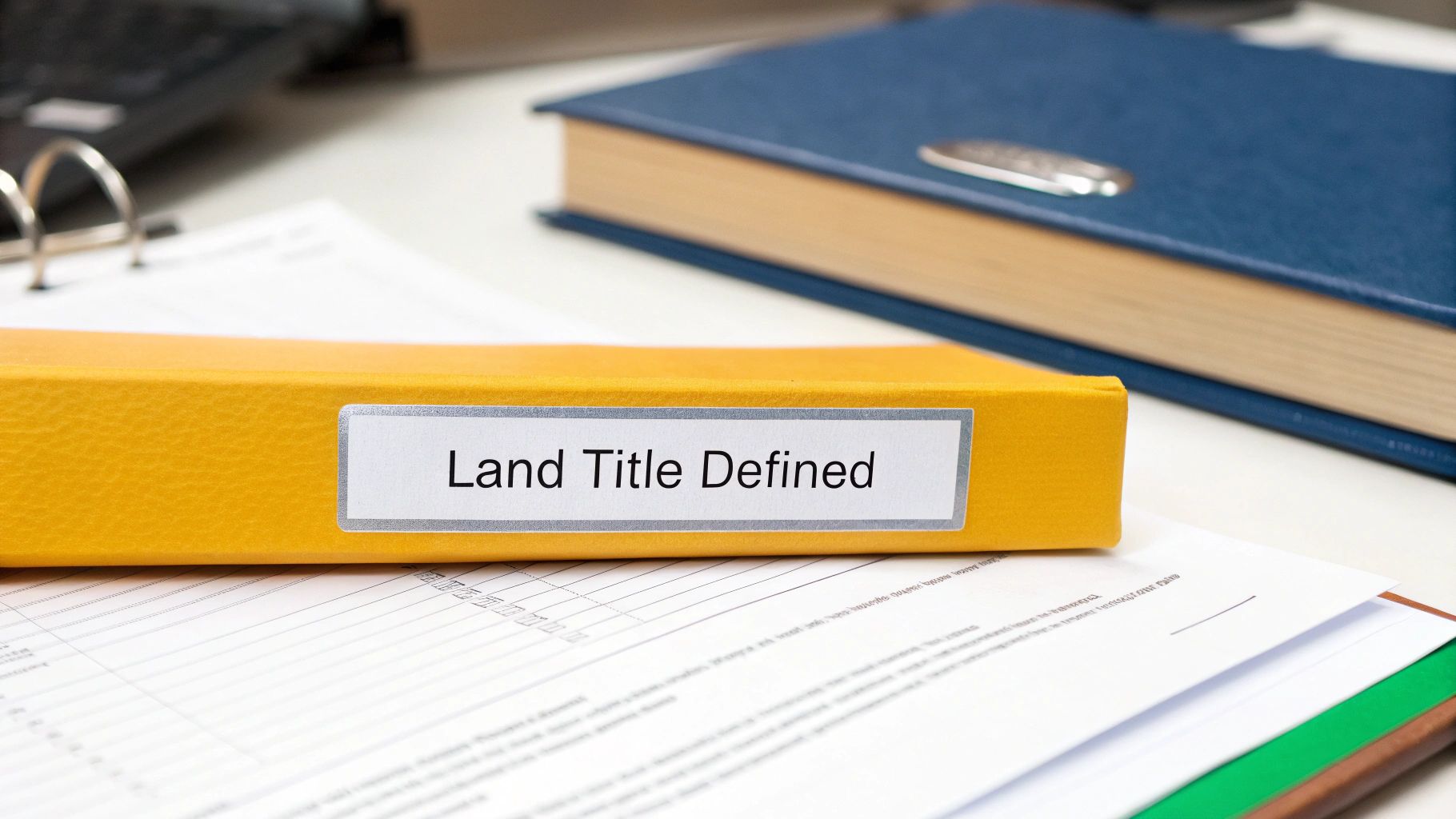
The best way to think about a titre foncier is to compare it to a property’s official birth certificate. Just like a birth certificate provides definitive, state-backed proof of a person's identity and existence, the titre foncier offers an undeniable, legally binding record of a property—its exact boundaries, its history, and its rightful owner.
This isn’t just another piece of administrative paper. It's the very foundation of property security in Morocco. The document is created through an exhaustive registration process called immatriculation. This process legally nullifies all previous claims on the land, a powerful legal principle known as the "purge." Once that title is issued, it's final and incontestable.
The Bedrock of Secure Ownership
For property owners, investors, and even banks, holding a titre foncier is like having an unbreakable shield. The Moroccan government, through its land registry agency (the ANCFCC), guarantees every detail on the title. This state-backed assurance provides incredible peace of mind and opens the door to significant economic opportunities, like securing a mortgage.
Without this official title, a property is typically considered melkia. This traditional form of ownership often relies on unwritten agreements and witness testimony, making it far more vulnerable to disputes and legal challenges. A titre foncier converts that uncertainty into absolute legal clarity.
The issuance of a titre foncier is central to Morocco's entire property system. The national land registry is a robust machine, issuing approximately 350,000 new land titles annually and serving nearly three million clients. It delivers almost 1.48 million certificates each year, reflecting a strong administrative commitment to securing property rights across the kingdom. If you're interested, you can discover more insights about Morocco's land tenure system and its broader impact.
Key Takeaway: The titre foncier is far more than a simple deed. It's a definitive legal instrument that offers absolute, indisputable proof of ownership, backed by the full authority of the Moroccan state.
Key Moroccan Land Title Terminology
To get comfortable with Moroccan property transactions, you’ll need to know a few key terms. This table is a quick reference guide to help you understand the essential vocabulary you'll encounter.
| French Term | Arabic Term (العبارة العربية) | English Meaning | Role in Property Transactions |
|---|---|---|---|
| Titre Foncier | الرسم العقاري (Al-Rasm Al-Aqari) | Land Title | The final, incontestable proof of property ownership. |
| Immatriculation | التحفيظ (Al-Tahfidh) | Land Registration | The official process of creating a new, modern land title. |
| Melkia | الملكية (Al-Melkia) | Traditional Deed | An unregistered form of ownership, often based on customary or verbal agreements. |
| ANCFCC | الوكالة الوطنية للمحافظة العقارية | National Land Registry Agency | The government body that issues, manages, and guarantees all land titles. |
Having a solid grasp of this terminology is the first step toward confidently navigating property deals in Morocco. Each term represents a core concept in a system designed to provide clarity and security.
The Unbeatable Legal Power of a Titre Foncier
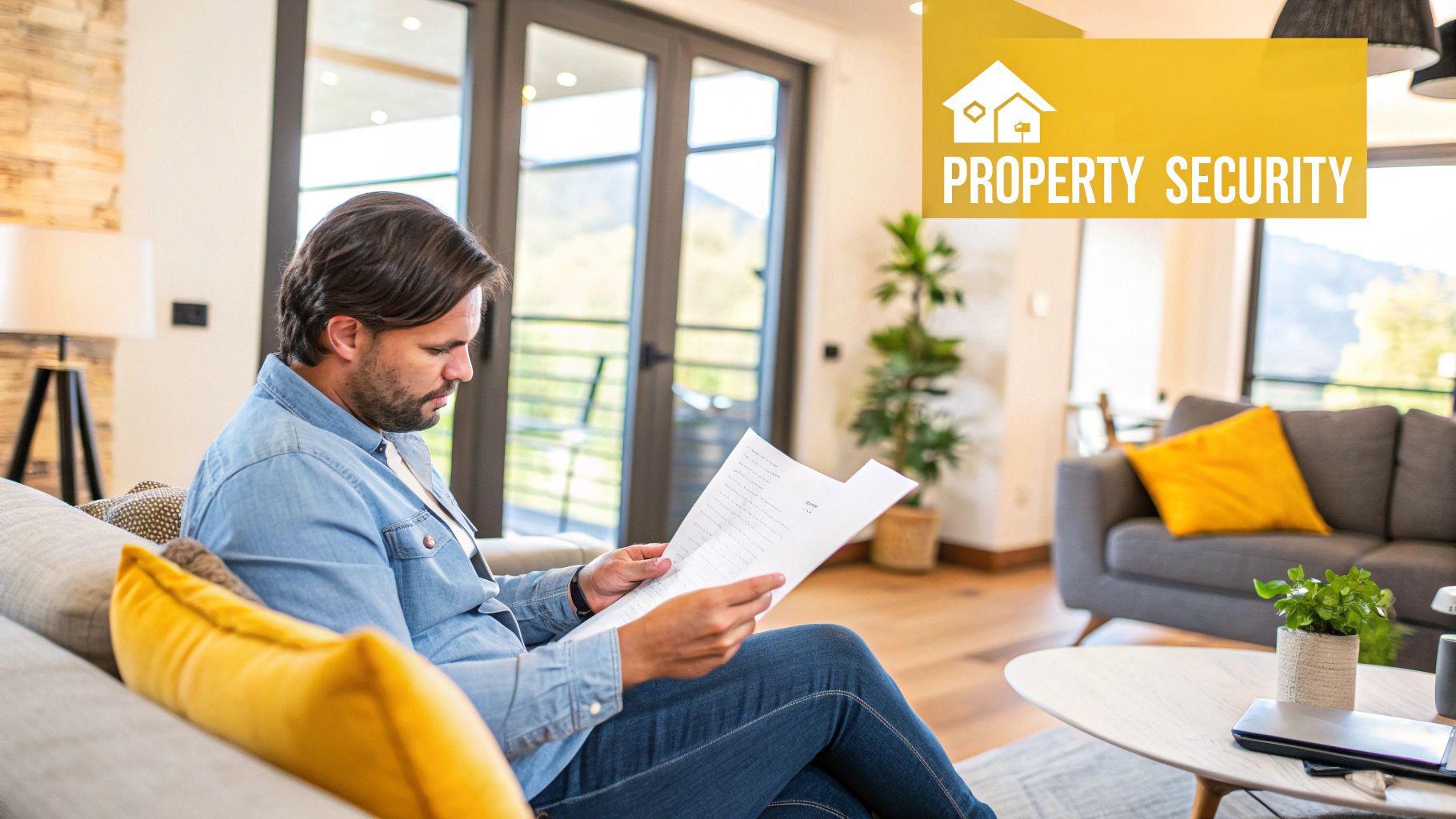
The true might of a titre foncier comes from its absolute legal authority. When a title is officially created, it sets in motion a powerful legal process known as the purge. This isn't just paperwork; it’s a legal event that completely erases—or "purges"—all previous, unrecorded rights and claims that might have existed on the land.
Think of it like a clean slate for the property. Any old ownership disputes, informal family arrangements, or historical claims that weren't brought forward and formally registered are legally nullified. From that moment on, the titre foncier is the one and only definitive truth about who owns the property. It’s unchallengeable based on any prior claims.
This ironclad security is a world away from the uncertainties of owning unregistered land, known locally as melkia.
The Risk of Unregistered Land (Melkia)
Owning a melkia property can feel like standing on shaky ground. Because these properties don't have a formal, state-guaranteed title, they're wide open to ownership conflicts. A distant relative, a neighbour, or someone with an old claim could emerge at any time, often dragging you into long, expensive, and stressful legal fights.
What's more, banks and financial institutions in Morocco are very reluctant to lend money against unregistered land. Without a titre foncier to act as solid collateral, securing a mortgage or other financing is nearly impossible. This can seriously limit what you can do with the property, whether you plan to build on it or sell it later. Our guide on investment in Morocco goes into more detail on why secure assets are critical.
The Moroccan state itself stands behind every single titre foncier. The Agence Nationale de la Conservation Foncière, du Cadastre et de la Cartographie (ANCFCC) is the government agency that guarantees the title's accuracy and validity. This makes the title more than just a piece of paper; it’s a promise of ownership backed by the government.
In short, a titre foncier is the strongest shield you can have for your property investment. It replaces ambiguity with absolute certainty, protecting your asset with the full force of Moroccan law.
How to Read Your Titre Foncier in Arabic
Staring at a Moroccan property title for the first time can be a bit daunting, especially when all the critical details are in Arabic. Don't worry, it's not as complex as it looks. Once you know the layout, reading your titre foncier in Arabic is actually quite straightforward. The document is structured logically, with designated spots for every key piece of information.
Think of it as your property's official biography. Each section tells a part of its story—from its unique identification number to a detailed account of its physical features and legal history. Learning to navigate these sections will turn what seems like a confusing legal form into a clear and valuable asset.
Before you even get to the title deed, you'll need a few other foundational documents to kick off the buying process. This image breaks down the essential paperwork you'll need to have ready.
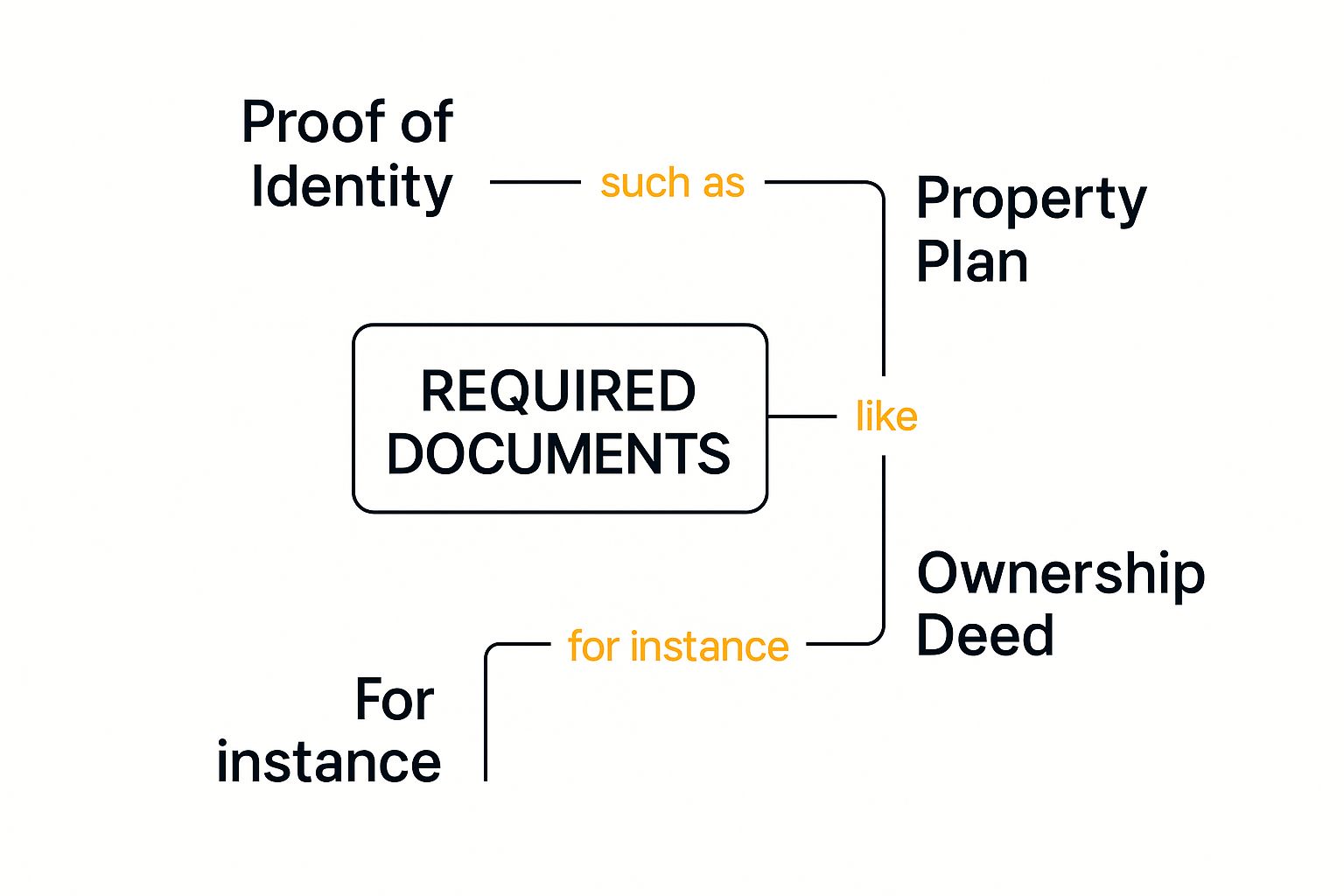
As you can see, having your proof of identity, the official property plan, and the ownership deed are the absolute cornerstones of any smooth property transaction in Morocco.
Key Fields on a Titre Foncier
To get you comfortable, let's walk through the most important sections you'll find on the document, complete with their Arabic names. Knowing these terms is the first step to confidently verifying all the details yourself.
The table below breaks down the anatomy of a standard Moroccan title deed. It highlights the essential information you'll find, what it's called in Arabic, and why each part is so important for your due diligence.
Anatomy of a Titre Foncier (الرسم العقاري)
| Section on Title | Arabic Term (العبارة العربية) | Information Provided | Why It Matters |
|---|---|---|---|
| Title Number | رقم الرسم العقاري (Raqm Al-Rasm Al-Aqari) | The property's unique identification number issued by the ANCFCC. | This is the single most important identifier for your property. It’s used in all official searches and legal proceedings. |
| Property Description | وصف العقار (Wasf Al-Aqar) | Details the property type (villa, apartment, land), address, and any specific names (e.g., "Villa Jasmine"). | Confirms the physical nature and location of what you are buying, ensuring it matches the property you viewed. |
| Surface Area | المساحة (Al-Misaha) | The exact, legally verified size of the property, measured in square metres. | This is a government-guaranteed figure. It protects you from disputes over the property’s dimensions. |
| Owner's Identity | هوية المالك (Huwiyyat Al-Malik) | Full legal name(s) and identification details of the current registered owner(s). | This is your proof that the seller has the legal authority to sell the property. It prevents fraudulent sales. |
| Registered Charges | التحملات العقارية (Al-Tahammulat Al-Aqariyya) | Lists any legal burdens on the property, such as mortgages (liens) or rights of way (easements). | A 'clean' title will have this section blank. It reveals if any third party has a legal claim on the property that could affect you. |
By familiarising yourself with these five key areas, you can quickly assess the most critical aspects of any property title. It transforms the document from a page of unfamiliar text into a clear snapshot of your potential investment.
Expert Tip: Your very first step should always be to cross-reference the Title Number (رقم الرسم العقاري) on your document with the records at the local ANCFCC office. It’s a simple check that confirms the title is authentic and that you’re looking at the most current version.
This crucial step protects you from working with outdated or fraudulent documents, providing a solid foundation for the rest of your due diligence. For a complete guide on the entire purchasing journey, from start to finish, see our detailed article on how to buy property in Morocco easily.
Driving Agricultural Growth Through Land Titling
The titre foncier is much more than just a piece of paper for a homeowner or investor. It’s actually a powerful engine for economic growth, especially in Morocco’s vital agricultural sector. For a farmer, holding a formal title is like finding the key that unlocks a whole new world of opportunity. It fundamentally changes a piece of land from a simple family asset into a bankable one.
With a state-guaranteed title in hand, farmers can walk into a bank with confidence and secure credit. This access to finance is a game-changer, enabling them to invest in modern equipment, better seeds, and efficient irrigation systems. It allows them to shift from mere subsistence farming to making strategic, long-term improvements to their land.
Modernising Moroccan Agriculture
Secure ownership also naturally encourages better land stewardship. A titre foncier provides the legal security needed to tackle one of the biggest challenges in Moroccan agriculture: the consolidation of fragmented land parcels. Instead of juggling several small, disconnected plots, farmers can create larger, more efficient, and far more productive holdings. This process is a cornerstone of modernising the entire sector.
Morocco’s farming landscape is overwhelmingly made up of small operations. In fact, surveys reveal that about 70% of Moroccan farms are smaller than five hectares, and the national average is just 5.7 hectares. For these farmers, a clear, registered titre foncier is essential for classifying this land, boosting its productivity, and managing it sustainably. You can read more research on Morocco's agricultural land use and its critical role in the economy.
By turning land into a secure, tradable, and financeable asset, the titre foncier system directly supports the modernisation of farming practices. This not only enhances the livelihoods of individual farmers but also strengthens Morocco's overall food security and economic resilience.
Ultimately, the impact of a secure land title ripples out far beyond a single property line, playing a foundational role in the country's agricultural future.
The Unique Challenge of Titling Communal Lands
So far, we've focused on property owned by individuals. But Morocco has another, far more complex category of land ownership: communal lands, known locally as terres collectives. These aren't just plots of land; they are vast territories stewarded by entire tribal communities, often for generations.
This traditional system of collective ownership, which supports the livelihoods of millions, is running up against Morocco's modern legal framework. The push to formalise every parcel with a titre foncier creates a natural tension. This is especially acute near expanding cities, where land values are skyrocketing, making these collectively-held territories prime targets for speculation.
A Gap Between Tradition and Modern Law
At its core, the problem is trying to fit a square peg into a round hole. How do you translate generations of customary, collective rights into a modern legal system that is built to recognise a single, registered owner? It’s a fundamental disconnect, and it's the main reason why registering these lands has been so painfully slow.
The scale of this issue is immense. Communal lands in Morocco cover approximately 15 million hectares and provide for about one-third of the population. Despite their importance, only around 2% have been formally registered with a titre foncier, even though applications cover over six million hectares.
This enormous registration gap shows just how big a hurdle this is for Morocco's national drive for land formalisation. To truly grasp the deep-seated complexities, it's worth reading a full analysis on Moroccan land ownership.
Successfully bridging this gap isn't just a legal or economic issue. It's about finding a way to unlock development while preserving the vital social fabric these lands have supported for centuries.
Frequently Asked Questions About Moroccan Land Titles
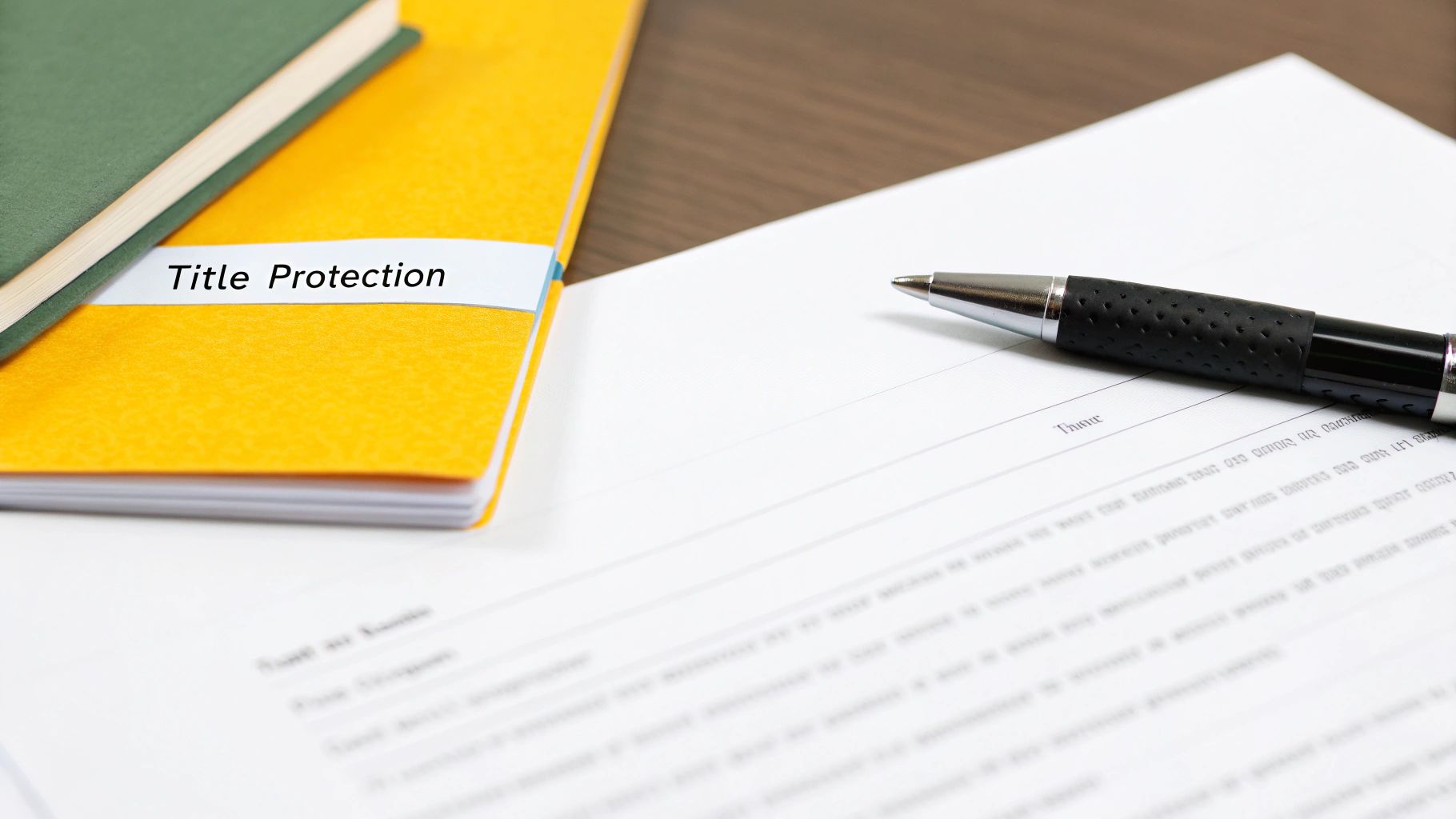
When you start exploring Moroccan property, a few key questions almost always come up. Getting straight answers is the first step towards a confident and secure purchase. Let’s dive into some of the most common queries we hear about land titles.
What Is the Difference Between a Titre Foncier and a Melkia?
Think of it like this: a titre foncier is a property's legal armour, while a melkia is a traditional claim.
The titre foncier is the gold standard. It's a definitive, state-guaranteed title registered with the national land agency (the ANCFCC). Once a property has a titre foncier, its ownership is final and cannot be contested. It’s your ultimate legal protection.
A melkia, however, represents a more traditional, unregistered form of ownership. These claims often lean on historical precedence and witness testimony rather than a centralised, modern registry. While culturally important, a melkia doesn't offer the same ironclad legal certainty and can sometimes lead to ownership disputes down the line.
How Can I Verify the Authenticity of a Titre Foncier?
Verifying a title is a non-negotiable step in your due diligence. It's also surprisingly straightforward. All you need is the property's unique title number (رقم الرسم العقاري).
With that number, you or your legal representative can request a certificat de propriété (certificate of ownership) from the local ANCFCC office. This document is a real-time, official report on the property, confirming:
- Who the current legal owner is.
- The precise boundaries and surface area.
- Any registered burdens, such as mortgages, liens, or other legal claims.
This certificate is the only way to be 100% sure that the title is legitimate and clear of any hidden issues.
Key Consideration for Foreign Buyers: Foreign nationals are welcome to buy most titled properties in Morocco, but there's one major exception: agricultural land. Non-Moroccans are not permitted to own agricultural land outright, although long-term leases of up to 99 years are possible. Knowing this distinction is crucial before you get too far into the process.
Beyond the legalities, it's always smart to get a handle on the day-to-day finances. For a closer look at what to expect, our guide on the cost of living in Morocco can give you a practical financial picture.
